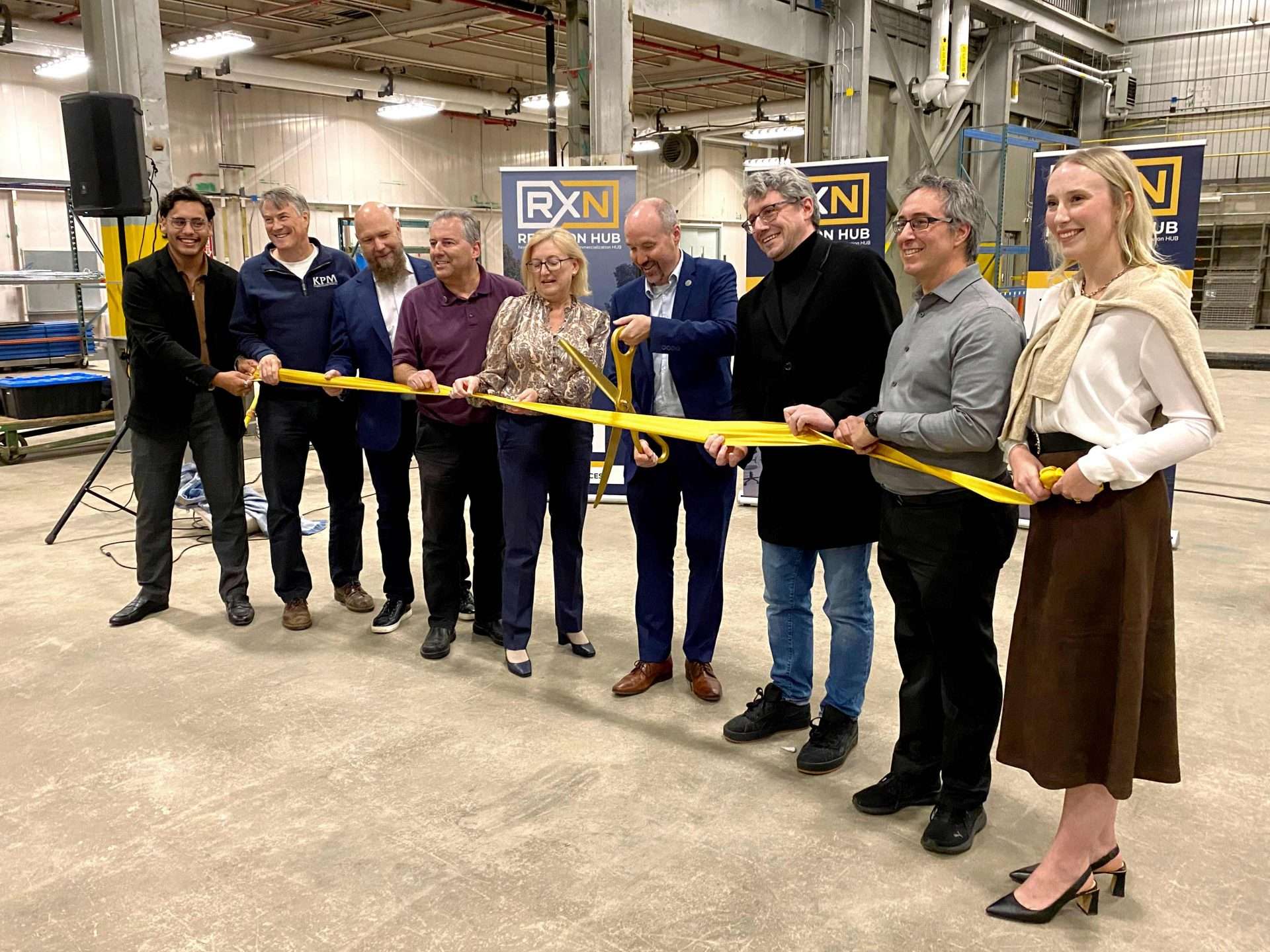Copyright Kingstonist

Kingston is now home to the only exclusive clean-tech research facility in Canada, if not the world, that aims to drive innovative ideas from concept to reality. Speeches and ribbon cutting marked the official opening of lab space covering 30,000 square feet within the former Alcan industrial research plant at 945 Princess Street on Monday, Oct. 20, 2025. The venture is run by The Reaction Hub (RXN), a not-for-profit company that supports commercialization of clean technology and chemical technology ventures by providing facilities, resources, and strategic guidance to help them scale from lab to market. Sebastian Alamillo, co-founder of RXN and its Director of Strategy and Industry, said there is no shortage of innovative ideas among entrepreneurs focused on creating a cleaner environment, and the company’s mission is to provide the pathway they need to succeed. As a non-profit, RXN gets revenues from renting out lab space to entrepreneurs and providing innovation consulting services. Alamillo said they aren’t looking for those who want to create the next big video game or hospital surgical tool. Instead, they want to attract young companies, or what they call “portfolio clients,” that will work on new inventions, processes, or equipment to reduce carbon emissions. Think of RXN as the Dragon’s Den business people who decide which upstart clean-tech ventures can work in its facility. “Once you’re here, it’s because we think your technology works and we think that you are able to [be a] benefit to the Canadian economy, and we’ll help you develop however you need to develop,” Alamillo explained. He said the biggest challenge facing many entrepreneurs is the need for spacious, affordable labs — known as accelerator space — to do the necessary research, testing and, ultimately, marketing of their systems to solve many global problems linked to climate change. The former Alcan building — with its mix of offices and high-ceiling warehouse/industrial designated rooms, including one that’s designed to absorb and vent energy caused by blasting — is considered ideal for clean-tech companies to safely test their products. Some products do have that explosive charm due to the fact that much of the innovation work is focused on chemistry. For the past century, Alamillo said, man-made chemicals have resulted in many of today’s environmental problems, like plastics and PFAS (often referred to as “forever chemicals,” as they don’t easily break down). “It’s now chemistry’s job to get us out of the climate mess we’re in by changing the way that we use our energy and changing the way that we process materials so it’s less toxic to the environment and ourselves,” Alamillo explained. The City of Kingston is a key partner in helping the four-year-old RXN get the financial support and massive space it needs to host several upstart companies, to grow their inventions and processes and, hopefully, bring them to markets around the world. As the first Ontario city to declare a climate emergency in 2019, Kingston invested $3 million to help RXN outfit labs in the former industrial building so it, in turn, can rent out lab space. Mayor Bryan Paterson said the City’s investment will make Kingston, and Canada, a leader in the transition to a clean economy by attracting entrepreneurs that promote sustainable energy and manufacturing. “This is one area where we knew we had a competitive advantage, and where we knew we could be a national leader. But it was going to require the City stepping forward and actually putting some money on the table to help make it happen,” Paterson said. He predicted the City will earn its investment back in spades through future job creation and potential companies making Kingston a home base for their clean-tech headquarters. Craig Desjardins, the City’s Director of Strategy, Innovation and Partnerships, said RXN is different from what Queen’s University and other companies are currently doing at the incubator level. RXN specializes in taking those ideas to the next level. “These are companies that have grown out of the lab that actually have ideas that work and now they need to scale up and do pilot projects,” Desjardins said. He also clarified that, while both are located in Innovation Park and both companies have similar missions, RXN Hub is not the same as Impact Chemistry, which used to be called Green Centre Canada. Impact Chemistry is focused on idea incubation, Desjardins said. That occurs earlier in the product development stage than RXN Hub, which is a business accelerator for companies that are scaling and commercializing their businesses, he explained. “The co-location and collaboration between the two organizations is the ideal relationship. Impact Chemistry proves the idea or concept and RXN Hub scales and commercializes the idea,” Desjardins said. “Ultimately, the goal is to build a connected ecosystem from the benches at Queen’s to the incubation at Impact Chemistry to the commercialization at RXN Hub to the industrial parks of the city for operations.” Desjardins agreed with the mayor that by offering companies a pathway to succeed, they are more likely to stay here. “We’ve had that challenge in Kingston, where companies have great things that happen but they can’t grow here, so we lose the economic benefits of jobs,” he said. So far, only one company, British-based UNDO Carbon, is occupying space at RXN’s spacious labs. UNDO’s lab is working to accelerate the geological process of rock weathering to remove dioxide emissions — a process done by spreading crushed wollastonite mineral on agricultural land to capture CO2 emissions at a much faster rate. The added benefit for farmers that use wollastonite is enriched soil. UNDO makes money by selling carbon credits, and the wollastonite comes from just outside of Kingston at Canadian Wollastonite on Highway 15 in Seeley’s Bay. RXN expects to rent space to at least six more fledgling companies in the first half of 2026, including a company that is working to develop a cheaper, sustainable asphalt-type material for roads that does not rely on bitumen carbon fuel for production and is more pothole-resistant. About 30 company officials, local politicians, and media attended a ribbon-cutting of the new facility and got a tour of the maze-like space. The entire 220,000 square foot facility is owned by Modern Niagara, which bought the property in 2021 and invested about $80 million of its own money into extensive renovations to reduce the massive building’s own carbon footprint. The City connected RXN with Modern Niagara, Canada’s largest mechanical contractor for HVAC, plumbing and low-carbon building technology services, which considered RXN a perfect fit for the building and its own mandate. “There’s a lot of synergies with what they are doing with what our industry needs to de-carbonize buildings,” said Andrew Creese, Modern Niagara’s Vice President of Real Estate and Investment. While Modern Niagara has rented a sizable portion of its building to RXN, it is currently seeking other office and lab tenants.



